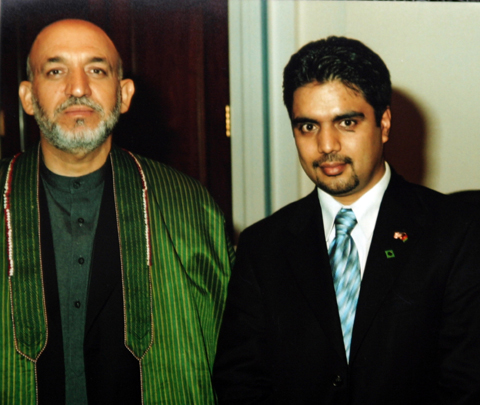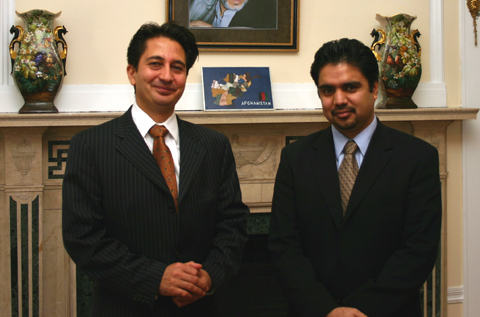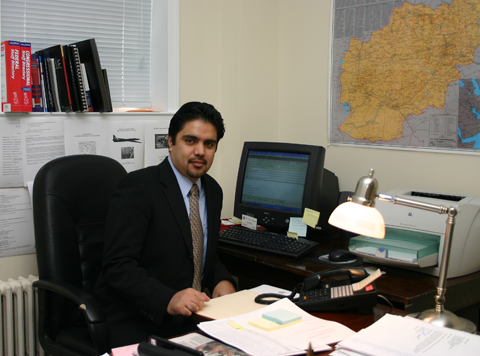Our Best Chance for Freedomby Steve Charles |
|||
| Printer-friendly version | Email this article | |||
ASHRAF HAIDARI WAS STUNNED as every one else at Washington D.C.’s Georgetown University when a hijacked American Airlines 757 slammed into the Pentagon on September 11, 2001.
Shocked and saddened. But after hearing the name of the terrorist group behind the killings, not surprised.
"At first we talked about my interning at the embassy and then working for President Karzai in Kabul after my studies were complete," Ashraf says. "But he offered me a second option—to begin working immediately and full-time at the embassy.
"I realized that our embassy here is really key to the process of rebuilding Afghanistan, and that I could be more helpful here now than I could be waiting to go help the president."
Ashraf took his position as government and media relations officer in April 2004 and was recently promoted to First Secretary.
Soon after joining the embassy staff, he was named advance man for President Karzai’s appearances in Chicago during his first state visit to the U.S.
"I guess I’m not afraid to try anything," says the man who as a teenager was held hostage at gunpoint by a band of Afghan militiamen.
He still possesses the gentle, respectful demeanor of his Wabash days, but carries the added intensity of a man who understands the importance of every connection he makes for the fledgling republic.
"My experiences in the camps, in the streets, and at Wabash all contributed to the skills I’m using now," he says. "Helping with presidential visits, speaking for the embassy, or going live on TV and radio shows—I just do it. There’s no time to be nervous; this is for my people. A chance for Afghans to tell our story. So many relief workers and so many others have gone to Afghanistan to help us, but at the end of the day, we Afghans must tell our stories, solve our problems, and ultimately take over the process of development. At the end of the day, we must stand on our own two feet to rebuild our country."
Near his office in the embassy, Haidari sits beside a painting of one of the Bamiyan Buddhas—the ancient statues carved from a cliffside that were destroyed by the Taliban, a gesture that defined Islamic fundamentalism for the world. The new government in Kabul plans to rebuild at least one of the statues.
"True Islam is about peace, unity, tolerance, and working together and consensus," Haidari says. "That is the faith that motivates me."
He recalls a class about the religions of India taught by Wabash Professor David Blix, a friend and one of his
In his current role, Haidari often defends his faith, or his country, against misconceptions.
"They said Afghans did not know what democracy is; that we’re illiterate, uneducated and backward," he says. "But I come from among these people. We’ve had 30 years of war, hardship, and desperation, and we’ve learned a great deal. We know what democracy is, and we know the alternatives if we don’t stand up and make our voices heard."
Haidari’s biweekly newsletter, speeches to college students, and research papers on the challenges his country faces illuminate a part of the world too few took notice of until 9/11. He believes that the consequences of such ignorance are a lasting lesson of the 9/11 attacks.
"The international community failed to engage these terrorists in Afghanistan and fight terror before it targeted them in their own countries," he says. "The world must now see that helping Afghanistan is helping themselves, for the sake of their own security."
In May, just a year after he began working at the embassy, Haidari helped to plan another state visit for Hamid Karzai—this time as the first democratically elected president of Afghanistan to visit the United States. When Presidents Karzai and Bush signed the Joint Declaration on the U.S.-Afghanistan Strategic Partnership, Haidari released the following statement:
"By signing the joint declaration, the two leaders re-affirmed their commitment to bilateral cooperation to fight terrorism and narcotics, consolidate democracy in Afghanistan through institutional building and economic development, and enabling Afghanistan to stand on its own feet for the long haul."
Only four years out from taking political science and history courses in Baxter Hall, Ashraf Haidari was making history of his own.
"I've been on the run since I left Afghanistan," he says. "I do look forward to some time relaxing; I just don’t know when. But I get this peace when I know that the lives of people in Afghanistan are changing for the better. Keeping Afghanistan in the media, telling the good news that the media doesn’t focus on, I think I can make a difference in these very crucial days."
As caught up as he is in his work, you can practically feel his smile through the phone when he talks about his wife, Lina.
She is a writer and Farsi poet who, like Ashraf, was an Afghan refugee and, later, a political science major in college. She works as a broadcaster for Voice of America on programs focusing on the rights of women in her native country.
In the Afghan tradition, they spoke only after Ashraf spoke with his family (the couple’s fathers are old friends), who arranged for the two to meet.
"I already knew of her commitment to the people of Afghanistan," Haidari says. "She has experienced hardships in life similar to my own. We had a lot in common, and I admire her personal qualities."
That last line evokes an affectionate laugh, and hopeful plans.
"Lina and I hope to return to Kabul this year to visit
Almost 2,500 years ago, Euripides wrote: "There is no greater sorrow on earth than the loss of one’s native land."
For two returning to their homeland, may there be no greater joy.
Photos: (top right) Haidari welcomed Afghan President Hamad Karzai and helped plan both of Karzai's visit to the United States; (middle left) Haidari with Afghan Ambassador to the U.S. Said Tayeb Jawad; (bottom right) Haidari at his desk in the Afghan Embassy in Washington, D.C.
Read Haidari's "Fighting Narcotics with Human Security"
Contact Ashraf at haidari@embassyofafghanistan.org
|

 Today, Haidari is a spokesman for the Islamic Republic of Afghanistan that rose up from that war. As First Secretary at the Afghan Embassy in Washington, he is an official voice in the U.S. of that emerging democracy.
Today, Haidari is a spokesman for the Islamic Republic of Afghanistan that rose up from that war. As First Secretary at the Afghan Embassy in Washington, he is an official voice in the U.S. of that emerging democracy. Haidari met Said Tayeb Jawad, the new Afghan ambassador to the U.S. and inquired about an internship. Jawad invited him to stop by the embassy. It didn’t take long for the ambassador to realize the many ways Ashraf could help his country.
Haidari met Said Tayeb Jawad, the new Afghan ambassador to the U.S. and inquired about an internship. Jawad invited him to stop by the embassy. It didn’t take long for the ambassador to realize the many ways Ashraf could help his country. HE HASN'T TAKEN a vacation in his life.
HE HASN'T TAKEN a vacation in his life.